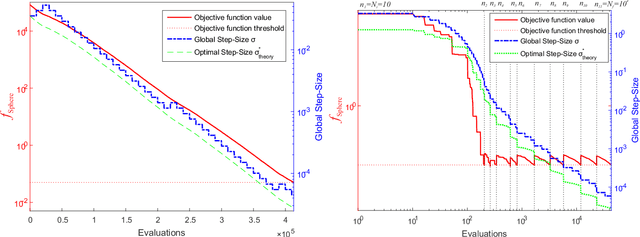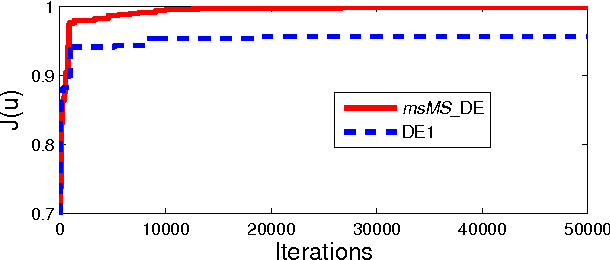Xi Xing
Multi-Level Evolution Strategies for High-Resolution Black-Box Control
Oct 04, 2020



Abstract:This paper introduces a multi-level (m-lev) mechanism into Evolution Strategies (ESs) in order to address a class of global optimization problems that could benefit from fine discretization of their decision variables. Such problems arise in engineering and scientific applications, which possess a multi-resolution control nature, and thus may be formulated either by means of low-resolution variants (providing coarser approximations with presumably lower accuracy for the general problem) or by high-resolution controls. A particular scientific application concerns practical Quantum Control (QC) problems, whose targeted optimal controls may be discretized to increasingly higher resolution, which in turn carries the potential to obtain better control yields. However, state-of-the-art derivative-free optimization heuristics for high-resolution formulations nominally call for an impractically large number of objective function calls. Therefore, an effective algorithmic treatment for such problems is needed. We introduce a framework with an automated scheme to facilitate guided-search over increasingly finer levels of control resolution for the optimization problem, whose on-the-fly learned parameters require careful adaptation. We instantiate the proposed m-lev self-adaptive ES framework by two specific strategies, namely the classical elitist single-child (1+1)-ES and the non-elitist multi-child derandomized $(\mu_W,\lambda)$-sep-CMA-ES. We first show that the approach is suitable by simulation-based optimization of QC systems which were heretofore viewed as too complex to address. We also present a laboratory proof-of-concept for the proposed approach on a basic experimental QC system objective.
Differential Evolution for Quantum Robust Control: Algorithm, Applications and Experiments
Feb 13, 2017



Abstract:Robust control design for quantum systems has been recognized as a key task in quantum information technology, molecular chemistry and atomic physics. In this paper, an improved differential evolution algorithm of msMS_DE is proposed to search robust fields for various quantum control problems. In msMS_DE, multiple samples are used for fitness evaluation and a mixed strategy is employed for mutation operation. In particular, the msMS_DE algorithm is applied to the control problem of open inhomogeneous quantum ensembles and the consensus problem of a quantum network with uncertainties. Numerical results are presented to demonstrate the excellent performance of the improved DE algorithm for these two classes of quantum robust control problems. Furthermore, msMS_DE is experimentally implemented on femtosecond laser control systems to generate good signals of two photon absorption and control fragmentation of halomethane molecules CH2BrI. Experimental results demonstrate excellent performance of msMS_DE in searching effective femtosecond laser pulses for various tasks.
 Add to Chrome
Add to Chrome Add to Firefox
Add to Firefox Add to Edge
Add to Edge